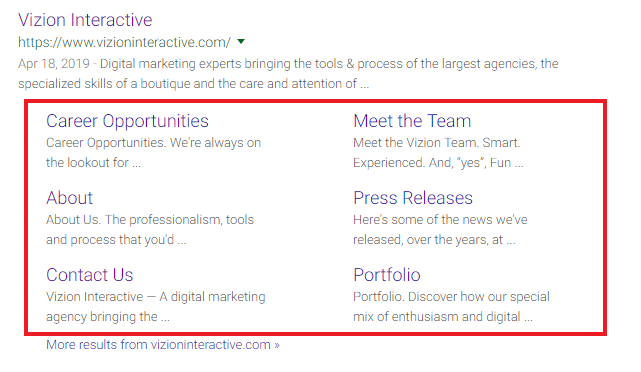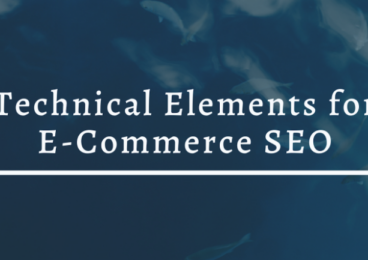 Reading Time: 4 minutes
Reading Time: 4 minutesAs a successful business marketer, you know the importance of optimizing your keyword selection within your pay-per-click ad campaigns so that your web page appears within the search engine results page (SERP) for relevant searches. Just as important is maintaining good search engine rankings so that your web page appears prominently on the SERP. A prominent location can help you increase your click through rate, as people who are looking for a business like yours are most likely to select one of the first few results on a SERP.
However, there is another key feature of the first result on a Google SERP that makes users more likely to click on it – the inclusion of site links. Optimizing your website to increase the likelihood Google will show site links is a great strategy to increase your click through rate. What are site links? Why are they so important? What are some best practices? Read on for a brief guide to site links.
What Are Site Links?
Site links appear as smaller sub-listings underneath the page title, URL, and page description on the SERP, usually when the user has searched for a brand. Considered a type of ad extension, site links provide a set of clickable links so your users can choose a specific area of your site to navigate to. This is especially useful when the user enters a brand or site name, but may not want the homepage.
For example, a user searching for the Widgets-R-Us brand may want to view widgets provided by the company, view shipping policies, or learn about the company’s history instead of viewing the homepage. Accordingly, site links show the user a few options for direct navigation other than the homepage itself. In this way, site links benefit both user and site owner.
Why Are Site Links Important?
The user benefits from site links because of the increased ability to navigate directly to the chosen site area directly from the SERP instead of needing to first navigate to the homepage, locate the correct page area, and then navigate to it. The user reaches the best landing page possible in a shorter amount of time. Thus, site links take the extra clicks and wait out of the navigation process, bringing the user to your page much more quickly.
You benefit for many of the same reasons – because the uncertainty of whether your site will meet the user’s needs, the user can quickly determine which of the featured landing pages may hold the content they seek, making it much more likely he or she will click in the first place. The user is more satisfied by the content after the click through, as well, since he or she navigated to the ideal landing page right off the bat. Quickly satisfied users are more likely to convert into consumers as well.
However, the primary SEO effect is even more simple. SERP results with site links are not only first on the list, but also more than twice the size of a regular result block. In addition, the user is aware on some level that Google trusts your site enough to provide extra links to it. Trust and prominence, then, are the names of the game; in fact, some experts credit site links with nearly a 65% increase in click throughs.
Site links also provide you with the opportunity to feature what you think is the most important information users should know about your product, service, or brand. For instance, your about page can provide crucial information about your brand that could lead to an eventual sale. Or, your site links could drive traffic to deeper pages on your site that provide the vital information critical to closing a sale or producing a lead, such as a toolkit, product guide, or other information the user cannot glean from skimming your homepage.
What Are Some Google Site Links Best Practices?
Unfortunately, getting Google to show site links is not as simple as simply requesting them, or choosing to pay a CPC for them. Google only shows site links for sites when they could prove useful to the user. However, if Google feels that your page may not provide relevant content for the user’s query, or if your site has a poor structure not conducive to site links, Google may not provide site links. It is important, then, to address your site to optimize for site links.
Some best practices include:
- Make sure your site is well-structured. In order for Google to produce site links from your page’s content, it must be able to understand all the sections of your pages and how each relates to the others. Your homepage is the most important page, and the basis for all the others. The others should then proceed in a logical order from the homepage.
- Add a sitemap. Adding a sitemap.xml file to your search console helps the Googlebot grow a better understanding of your site, including the structure of your site as mentioned above. The pages you mark as important in the sitemap may become the subject of site links.
- Make sure your site has crucial components. Ensuring your page has the most logical page components for Google to include as additional site links increase your chances of having site links added to your SERP result. These include About, Contact Us, Products pages, and Search, among others. In addition, make sure all these pages have the classic, proper names for easy identification by the automated process.
- Include internal links. If other pages on your site link consistently to the pages you deem the most important, such as product pages or About pages, Google may recognize their importance as well. This has a double benefit, since it may increase the likelihood of site links as well as helping ensure your most important pages are those featured on your site links.
- Rank first. Overall, the most important factor in getting site links is ranking first for your brand. If you have an easily recognizable brand, engage in good site practices, and provide useful content for your users, who continue to click through, ranking first for your brand may not be difficult. However, if you have a more common brand name, or one easily misconstrued for a common product name or common noun, you may have more trouble.
At Vizion Interactive, we have the expertise, experience, and enthusiasm to get results and keep clients happy! Learn more about how our SEO Audits, Local Listing Management, Website Redesign Consulting, and B2B digital marketing services can increase sales and boost your ROI. But don’t just take our word for it, check out what our clients have to say, along with our case studies.




